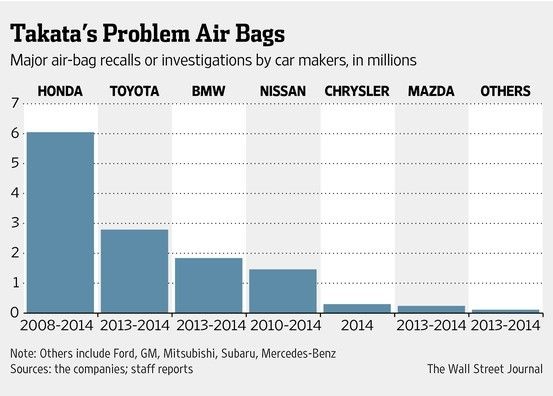More than 14 million vehicles have been recalled by 11 automakers due to defective airbags produced by Japanese airbag supplier, Takata. In April and May of 2013, several Japanese automakers, along with BMW, recalled 3.6 million cars containing Takata airbags. Most recently, in June of this year, several additional automakers—Toyota, Honda, Nissan, BMW, Mazda, Ford, and Chrysler—announced recalls of millions of additional vehicles equipped with Takata airbags.
The recalls have been issued in light of a number of reports that the airbags are prone to explode upon deployment, sending shrapnel and chemicals throughout the vehicle’s cabin, potentially resulting in severe injuries to drivers and passengers. CBS News interviewed Stephanie Erdman, a woman allegedly maimed by the faulty airbag.
CALL 866-709-0505 OR CONTACT US ONLINE FOR A FREE, CONFIDENTIAL CONSULTATION.
Thus far, at least two deaths and more than 30 injuries have been attributed to ruptures in these airbags. However, complaints received by state and federal regulators indicate that the problem may be far more widespread. In response, the National Highway Traffic Safety Administration (NTSHA) has recently opened an investigation to determine the cause of the deadly defect.
Takata’s defective airbags were developed in the late 1990s and placed in automobiles beginning in the 1998 model year. Takata designed these products to inflate by means of an explosive encased in a metal canister. The explosive is based on a chemical compound found in common fertilizers. Analysts say Takata’s inflating propellant is cheaper than competitors’ propellants, but particularly volatile.
Click to contact our personal injury lawyers today
Honda, which has had a long-standing relationship with Takata, was the first automaker to recall its vehicles containing the defective airbags, when it recalled 4,000 vehicles in 2008. Since the initial 2008 recall, Honda has issued eight additional recalls related to the exploding Takata airbags, bringing the total of recalled Honda and Acura vehicles to over six million.
Complete a Free Case Evaluation form now
In addition, both Honda and Takata have been accused of failing to disclose the danger of exploding airbags for several years despite its knowledge of such defects. According to the National Highway Traffic Safety Administration, Honda reported the number of deaths and injuries to regulators in a confidential submission in December 2011, several years after it first became aware of the link between the airbags and injury. Further, in a report by the New York Times, it is alleged that Honda failed to provide information to federal safety regulators as to the specific cause of injuries in 2004 and 2007—that the airbags ruptured.
Of note, the Takata airbag recalls are, at this point, only regional in nature. The recalls apply only to vehicles located in
- Florida
- Hawaii
- Puerto Rico
- California
- Texas
- Louisiana
- Mississippi
- Alabama
- Georgia
- South Carolina
- and the U.S. Virgin Islands
The Wall Street Journal has compiled recall data into a graph:

The nature of the airbag problem—according to Takata—is climate-related and due to high humidity. However, this theory is in question, as serious injuries have been reported in other areas of the country, such as Virginia and Oklahoma, where two people have been killed by the faulty airbags. The recall efforts concerning the airbags are in their early stages, and it is foreseeable that the geographic scope of the recalls could broaden as more information is uncovered. Ashcraft & Gerel will keep the public informed of any developments in this story.
